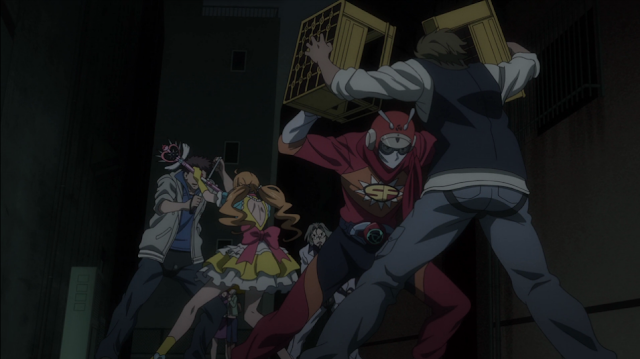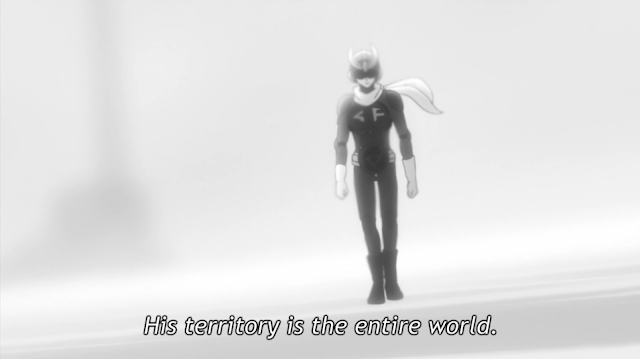Every Friday in "'Brokedown Merry-Go-Round' Show of the Week," I discuss the week's best first-run animated series episode I saw. "Brokedown Merry-Go-Round," a two-hour block of original score tracks from animated shows or movies, airs weekdays at 2pm Pacific on AFOS.
I almost named Bob's Burgers this week's best first-run animated show. Its first new episode after the Fox "Animation Domination" lineup's pre-emption by baseball coverage featured both a funny vocal guest shot by Will Forte as a skirt-chasing pilot with an eye on Linda (in this Bob's Burgers guest shot and 2010's MacGruber, Forte has been giving Will Ferrell a run for his money as the funniest at male crying scenes) and a couple of those great rapid-fire exchanges that Bob's Burgers excels at on the regular: the camera ping-pongs back and forth between the absurd things the three Belcher siblings say and the reactions of either a quietly frustrated Bob or some other adult. But the Belchers were outshined this week by Samurai Flamenco, which has been killing it in the last couple of weeks and does so again, with an episode that dials down the comedy a bit when Hazama, who's becoming disenchanted with both his forced partnership with Flamenco Girl and a surprisingly dull acting job on the set of a superhero show he likes, receives in the mail an important 20th birthday present from his deceased grandfather.
The present contains a new helmet with horns--a slight upgrade from the chintzy bike helmet Hazama's been rocking--and a letter from Hazama's grandfather, whom we learn had raised Hazama after his parents' deaths. Hazama's grandfather came up with the concept for Samurai Flamenco ("Born from the strength of a samurai and the passion of flamenco") and inspired Hazama to become the real-life superhero he envisioned in detailed "Samurai Flamenco Project" notes he also left in the parcel.
"Samurai Flamenco is the manifestation of universal and absolute justice. When faced with danger, he will never give up. When the going gets tough, he will never run and hide," says Hazama's granddad in the letter. His encouraging words pull Hazama out of his funk and give him the courage to tell Mari, whose bossiness and extremist approach to busting criminals have made him less enthusiastic about crimefighting, that he wants out of the partnership.
The affecting sequence in which we hear the letter being read by the granddad's voice is a bit reminiscent of Bruce Wayne's flashback to watching the superhero show The Gray Ghost when his father was alive in Batman: The Animated Series' classic "Beware the Gray Ghost" episode. Hazama and his granddad bonded over the superhero genre in the same way that Bruce and Dr. Thomas Wayne bonded over the show that later gave Bruce a few ideas for his crimefighting persona. The black-and-white images of the granddad's vision of Samurai Flamenco are even drawn in the same smoky and noirish style that made the black-and-white footage of the Gray Ghost show stand out in the Batman episode. The letter sequence has an edge over the flashback to little Bruce: it never shows either Hazama's granddad or Hazama as a kid, and it's slightly more powerful that way.
Hazama's reading of the letter is one of the most impressive sequences Samurai Flamenco has pulled off so far, not just because of its dramatic value, but also because of the skillful way it intercuts with Goto overcoming a similar existential crisis about his mundane duties when he types up a proposal to the Tokyo police department's newly formed Vigilante Counseling Unit about allying with Samurai Flamenco instead of treating him as an antagonist. Goto's superiors give the proposal their approval and reward Goto with a transfer to the new unit, which assigns him with tasks that make him feel more useful as a cop and are a step up from the petty complaints about injuries from falling ramen bowls that he dreaded responding to and were assigned to the uniformed officers strictly to create good PR for the department.
The new job also allows Goto to keep a better eye on both his friend and Flamenco Girl, whose adversaries have gotten nastier and more brutal, like the female stick-up artist who fakes being mugged by her two male accomplices in order to trap either of the Flamencos and snare a million-yen reward for unmasking either of them (actually, it's an extra mil for Flamenco Girl). The increasing brutality is starting to physically take its toll on Mari, who's forced to handle the streets on her own when Hazama becomes too busy to suit up due to the hectic shooting schedule of his TV show guest shot.
Without Hazama by her side, Mari is forced to also spend less time on composing songs for her band Mineral Miracle Muse, which worries both Mizuki, the Mineral Miracle Muse frontwoman, and Moe, the shy bandmate who's nursing a crush on Mari ("That kiss was longer than usual," noted Moe right after an overjoyed-from-crimefighting Mari planted a kiss on her last week). But after the letter restores Hazama's faith in his own cause, he surprises Mari by arriving just in time to help her triumph over the scummy trio of reward-seekers when she encounters them again and they bring with them extra henchmen, and for the first--and what ends up being last--time in their partnership, Samurai Flamenco and Flamenco Girl really gel into a formidable fighting force. What isn't as clear is the fate of Hazama's acting job, which isn't as fun or exciting as he thought it would be (the veteran TV director's lack of enthusiasm for the superhero material especially bums out Hazama, who's been fanboying big-time about the superhero shows he's directed). Did Hazama walk out on the role to help Mari (Sumi, who got him the bit part and hates playing babysitter to her inept client, is sure to be thrilled if he did indeed quit)? "The Meaning of Justice" glosses over that superhero show subplot too quickly.
When Samurai Flamenco tells Flamenco Girl he wants to be solo again, she neither reacts psychotically nor exposes his identity like she originally threatened to do (although I have a feeling that she's going to threaten to spill it again at a later point in the series). Mari admits that they might grow to become enemies if they continue working together ("It sucks that I'm losing a slave," she says), so she agrees to let him go and as we see in the show's most enjoyable post-credits tag so far, she forms with Moe and a reluctant (and amusingly clumsy) Mizuki a new trio of crimefighting magical girls called the Flamenco Girls. So that now makes it four wanna-be superheroes Goto has to keep an eye on, with one of them--Mari, not Hazama, whom a certain sector of the show's female fans would rather see snuggling with Goto--nursing a nasty crush on the uniformed cop.
This show just keeps getting better, doesn't it? And could the new helmet be the first of many costume upgrades that will lead to the snazzy armored suit Hazama wears in his dream during the show's opening credits?
Stray observations:
* Speaking of the new headgear, in the post-credits tag, there's a helmet blooper. During the first sighting of the Flamenco Girls, Hazama's wearing the old bike helmet again instead of the birthday gift from his grandfather.
* I love how drab the surroundings are when the Flamenco Girls make their splashy debut.
* Kaname's inability to keep his promises to help out Hazama when he patrols the streets is becoming a great running gag, as is his self-absorbedness (like when he didn't seem to be able to remember Hazama's name last week or when he's too wrapped up in watching episodes of his own show on TV to pay attention to Hazama). This week, "a film festival in France" is Kaname's excuse for skipping out on Hazama.
* Goateed news site editor Akira Konno (Satoshi Mikami) tries and fails once again to score a date with Sumi, who continues to deny Akira's insinuations that Samurai Flamenco is Hazama. Somebody on an anime blog said that they couldn't buy Sumi's unwillingness to cash in on Hazama's fame and hype him up as the world's first fashion model/superhero celebrity. I have a feeling that Sumi does know that he's Hazama and doesn't want it to be true because of the PR headaches she'd have to deal with if his crimefighting identity were revealed to the world. Hazama's immaturity is enough of a hassle for her.
* Unless I'm mistaken, there's one more regular character from the opening credits who has yet to appear on the show: Jun Harazuka (Toru Okawa), who, according to the manglobe animation studio's press notes, is "an older man who works in the development department of Monsters Stationary [sic]." Could he be an old friend of Hazama's grandfather's who ends up helping upgrade the Samurai Flamenco suit? We still don't know what the granddad's job was. Judging from the stacks of blueprints in the parcel, I'm going with "stationery artist."
* We still haven't seen Goto's girlfriend, who's becoming increasingly testy in her texts to Goto. Maybe she's actually Jun, who's catfishing Goto for some reason.
* Somebody was temp-tracking Samurai Flamenco with both the '70s Gatchaman theme and the Pink Panther theme big-time this week.
* The Brass Rangers, the brass band-themed superheroes from the show Hazama has a bit part in, and their Wolverine-clawed nemesis Chalkboard Screechy Screech are an amusing pack of fake superhero genre characters, even though the Brass Rangers' poses bring back horrible memories of the 1978 movie version of Sgt. Pepper's Lonely Hearts Club Band. Finally, a team of superheroes that band geeks everywhere can cream their marching band pants about.












No comments:
Post a Comment